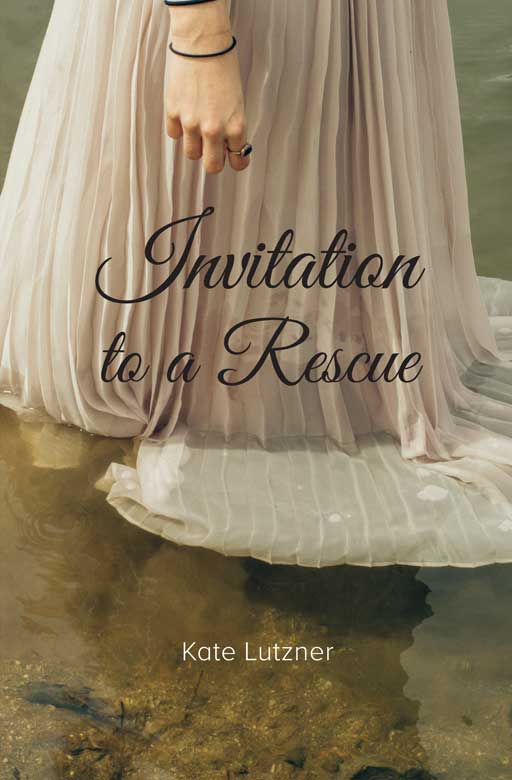Presto Manifesto
I
Exegesis
reach
space bend
time
II
Greater forces
We guess
two dots
three spirals
all paisley Read More >

Presto Manifesto
I
Exegesis
reach
space bend
time
II
Greater forces
We guess
two dots
three spirals
all paisley Read More >
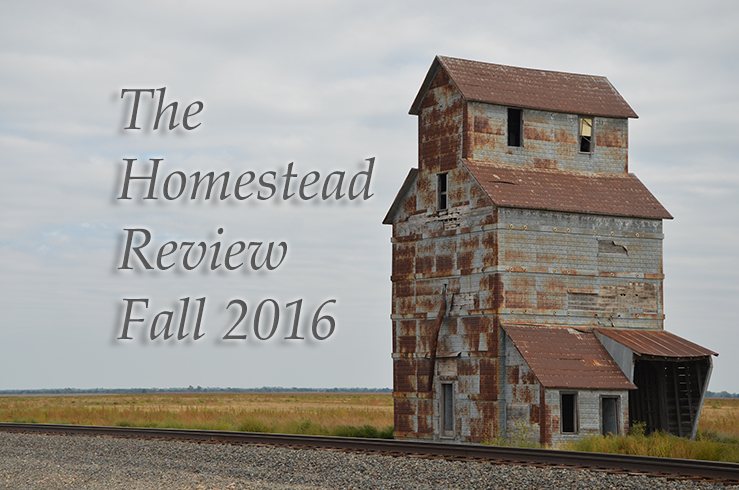
To read the full edition of fall 2016 Homestead Review click here!
Jeffrey Alfier

Laurie Anderson’s Yodel
In the early 80’s I heard Laurie Anderson sing “yodel-a-he-hoo, Big Science . . .” and have been possessed by the refrain every since. I had no idea at the time she would become the multimedia goddess she is today. I didn’t know she’d take me with her into the endless universe of her art, with the admonition, “don’t forget your mittens.”
Since that time electronic music has found its way into the mainstream and, as often happens, has often been watered down to a barely palatable mush. Laurie has kept pushing the limits of her art by simultaneously interacting with and reinterpreting popular culture through her shows. Each performance is a singular experience because she is attuned to her audience. She reminds us of the limitless capacity for creation we each have as individuals while awakening our collective mindfulness.
You cannot help but be present at one of Laurie’s shows. I often look out at the sea of faces filled with silent “O’s”: it is not so much awe or worship, it is the recognition of the boundless possibilities inherent in each of us.
Universe: E=mc2
Art: Laurie Anderson = (strangeness + beauty)music
Maria Garcia Teutsch
President, Henry Miller Memorial Library
Editor-in-chief, Ping-Pong Publications
(Original program note for Laurie Anderson’s concert at the Henry Miller Memorial Library July 26, 2005, signed for my son).
“It was sublime to play in the mist under the gigantic trees.
One of the most beautiful and spiritual places in the world.”
– Laurie Anderson about the Henry Miller Memorial Library.

Happy Spring! This month offers us daffodils, cherry blossoms and best of all, my birthday, I mean, National Poetry Month! I have chosen yet another stellar poet, Lauren Gordon who asks us in the following poem, what prayer feels right in your mouth?
Quality of Life
The baby wants a parable for a good life, one of top milk
and caramel, a garden with pumpkins to kneel by and confess
a daily admission of weakness, where a squash tendril traffics
the trellis under an orange patina of sunshine. I will tell her
how winter saturates so deeply that every new breath escapes
without feet, how half of every mother’s heart is a chrome shadow.
Dirt pilled with pink egg shells, star clustered loam and her hands
balling into the deep black of it, this earth like a dilating pupil.
Pain insists on being tended to, I will say in our garden of silence.
A skinny sorrow stays us in the sad sands until we detach our heads
in surrender and this is what we grow, how we lie, how we will
spend our lives finding a prayer that feels right in our mouths.
Lauren Gordon is the author of four chapbooks, “Meaningful Fingers” (Finishing Line Press, 2014), “Keen” (Horse Less Press, 2014), “Fiddle Is Flood” (Blood Pudding Press, 2015), and “Generalizations about Spines” (Yellow Flag Press, 2015). She has been nominated for several Pushcart Prizes and Best of the Net awards and her work has appeared in such journals as Sugar House Review, burntdistrict, MiPOesias, The Andirondack Review, The Collagist, and Coldfront Magazine. She is a Contributing Editor to Radius Lit and lives with her family outside of Milwaukee.
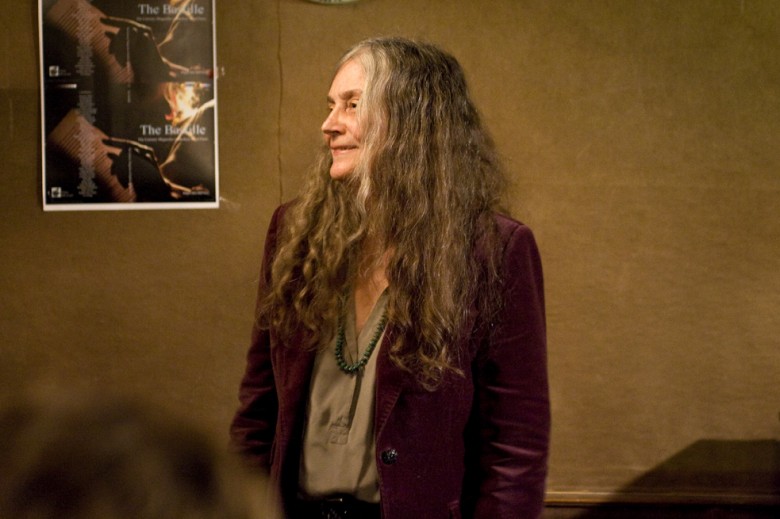
March is Women’s History month. As a tribute, I would like to share one of my favorite poets of all time, Alice Notley. She may resist categorization, but she has done more for women’s poetics than possibly any other poet alive. If you don’t believe me, please read, The Descent of Alette. Who is a woman who has inspired you?
THAT I MAY LIVE
I step across and can no longer make myself understood.
Listen to Torna a Sorrento concentratedly
I don’t understand Italian I understand the song.
I’m here. You can’t return because
a former life is not available; they read dis-
sertations there now. The clean glass of sparkling
water is for my mother.
Who will I write
for, alive? Into the air of you. This sadness,
rather than gotten rid of, is become another;
a quality both thicker and lighter
You still don’t understand that you too must
change; you value phantoms: I’m talking
to you — but my phantoms are real. You all
value material comfort over knowing a thing–
who is speaking?
I have none; the counterclock stops; though
it’s late where you are.
Alice Notley is the author of over twenty-five books of poetry, including 165 Meeting House Lane (1971), Phoebe Light (1973), Incidentals in the Day World (1973), For Frank O’Hara’s Birthday (1976), Alice Ordered Me to Be Made: Poems 1975 (1976), Dr. Williams’ Heiresses (1980), How Spring Comes (1981), which received the San Francisco Poetry Award, Waltzing Matilda (1981), Margaret & Dusty (1985), From a Work in Progress (1988), Homer’s Art (1990), To Say You (1993), Selected Poems of Alice Notley (1993), The Descent of Alette (1996), among many others. Mysteries of Small Houses (1998) won the Los Angeles Times Book Prize, and her collection Disobedience (2001) was awarded the Griffin International Poetry Prize. Notley’s recent work includes From the Beginning (2004), Alma, or the Dead Women (2006), Grave of Light: New and Selected Poems 1970-2005), which received the Lenore Marshall Poetry Prize, In the Pines (2007), Culture of One (2011), and Songs and Stories of the Ghouls (2011).
originally published in Ping-Pong 2014.
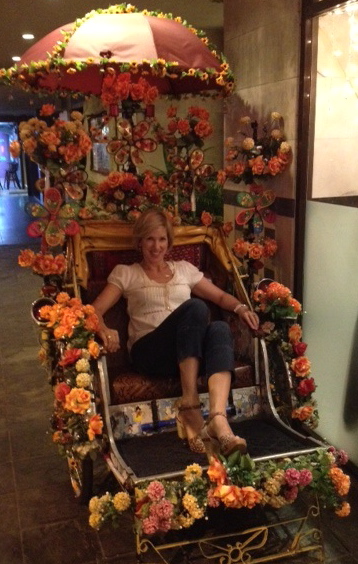
Thank you to editor Jillian Mukavetz and womens quarterly conversation for asking me really smart and fun questions.
Here’s the introduction to the interview, for the full text please click here:
womens quarterly conversation profile in poetics with Maria Garcia Teutsch
You are sitting beneath the shade of a coral curtain. The curtain was created by ‘we’ hand-strung ornaments, balanced from sandy trees in the Far East. In the Western hemisphere of the world ‘I’ stretch out my legs on a plush Ikea perch, making sure to check if ‘I’ have enough. Carbon dioxide cartridges for my home made sparkling mineral beverage, for example. Take a step away from the romanticization of these images and ask yourself the following. Does patriarchal structure and commodification depend on its cultural configuration? How does self and subjugation interplay in the conversation? Does identity depend on its soil? We converse today with Maria Garcia Teutsch: a writer whose journey in this interview begins as a young girl planter of wishes. Read More >

I would like to thank Heather McHugh and the editors at Minerva Rising journal for selecting my collection of poems, The Revolution Will Have its Sky, which will be published this year:
Thoughts on The Revolution Will Have Its Sky by Emily Shearer
The personal is political, and politics are everywhere: the courtroom, the throne room, the confessional (real or fake), the brothel, the gallows, and the street corners. Here in The Revolution Will Have Its Sky, Maria Garcia Teutsch presents a manifesto for an ageless cause. By turning her poetic tricks, she conflates image and casts aspersions–we see shadow and reflection, we see queen as whore and judge as prophet as well as thief.
Read More >
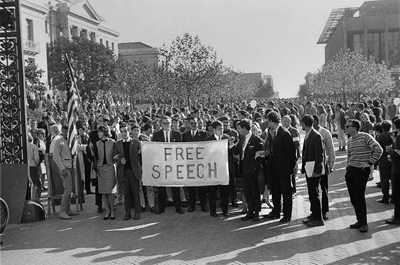
Cheyanne Gustason wrote a wonderful review of Ping-Pong 2014 for this issue of NewPages. This issue of Ping-Pong focused on Free speech as we celebrated the 50th anniversary of the free speech trial of Henry Miller’s book, Tropic of Cancer.
Ping•Pong
2014
Annual
Review by Cheyanne Gustason
If you have ever visited the Henry Miller Library in Big Sur, California, you likely noticed a ping-pong table. This table, nestled amidst towering redwood trees, brings the library’s many visitors together in a single place, with a single purpose: ping-pong. It is appropriate, then, that the Library’s literary journal, Ping•Pong, unites a wide array of voices and works in a single volume, and to common purpose.
The 2014 issue of Ping•Pong centers on topics of freedom and censorship, themes central to the life and legacy of Henry Miller himself. Editor-in-Chief Maria Garcia Teutsch begins her opening letter with the statement, “speech is not free, someone has paid the tab for you.” (iii) While the journal contains a variety of poems, artwork, short stories, and more, there runs throughout its pages an appreciation of those who paid the tab and paved the way.
Some of this appreciation is obvious, like the discussion and inclusion of works by Russian poets including Anna Akhmatova and Vladimir Mayakovsky, who were mercilessly persecuted in early 20th century Russia. Works by these two, and some of their peers, have been translated into English included in this issue of Ping•Pong. These pieces, surrounded by modern works, raise questions about the nature of censorship and its cost, to both individuals and society. Many of the translated Russian pieces have a surreal slant, which makes it all the more biting when they depict cruelties and violent ironies that are all too real. In an excerpt from “Wild Honey Is a Smell of Freedom,” Akhmatova writes “Wild honey has a scent – of freedom [. . .] But we have learned that// blood smells only of blood.” (100) Written in Leningrad in 1934, one can hear the echoes of revolution, of strong spirits and stronger institutions, and the realities of censorship and the importance of the creative voice are made all the more resoundingly clear.
The issue is not all heavy-handed. Quite the contrary. There are many pieces that are not only thought-provoking, but artfully elicit smiles and laughter, both bitter and mirthful, as well. Yet even these lighter pieces explore themes of censorship and material that might be condemned if not for our forefathers of free speech. Jeanine Deibel’s poem “A-Team: Swinging the Lead” is a delightful trip through the possibilities of alliteration. Some favorite lines: “My power animal is an antelope/ I worship Angus idols/I curse in my alphabet soup.” (36) Even this- to curse in alphabet soup, is that not a subversion of a comfortable classic? Is such subversion necessary, imperative, even just plausible, to bolster artistic freedom? Throughout Ping•Pong, even moments of levity harbor serious and thought-provoking undercurrents.
Resting at the end of the issue is an interview with poet Alice Notley. It is a fitting finale, as Notley discusses many themes pertinent to the other works and the issue in general. She mentions her work with Allen Ginsberg, who was no stranger to issues of censorship and artistic freedom. She discusses her process, sharing her work (or not), and differences between France, the United States, and Germany in both language and acceptance. At one point she claims, “Sometime [sic] I suspect the French of not liking poetry at all.” (196)
Ping•Pong is host to many styles of writing and expression, and a wide array of authors, which makes it a dynamic petri dish of creativity (and a lot of fun to read). Some pieces brought tears to my eyes (I won’t say which, you’ll have to guess). Others had me shaking my head, or my fist, at either the content, or the way it would once have been (or still might be) suppressed. There is humanity, beauty, heartbreak, and elation, as well as (sometimes disturbing) profanity, sexuality, and violence; and all have a voice in the poems and fiction seen here. The art included in this issue is also intriguing and thought provoking, fitting nicely with the themes and emotions displayed in the written pieces. In fact, I would look forward to seeing a bit more visual art included in Ping•Pong’s next issue.
Appropriately, this year marks the fiftieth anniversary of the Supreme Court decision that made Henry Miller’s classic Tropic of Cancer legal to read and sell in the United States. While Miller’s persecution may not have equaled that of writers like Ahkmatova and Mayakovsky, it is also not so long ago that Miller’s work was verboten in our “land of the free.” Ping•Pong, much like the library that publishes it, perpetuates the legacy of Henry Miller’s work, which includes the freedom of all writers and artists to be seen and heard. This edition of the journal explores and expands on these themes, making it not only an enjoyable read, but an important one as well.
Originally published on NewPages here.
Henry Miller Memorial Library blog here.
Author Bio:
Cheyanne Gustason is a writer and artist living in Los Angeles, California. She has written for Backstage Magazine and is currently working on her first children’s book. She has Bachelor of Arts degrees in Film & Media Studies and History, and recently earned a Juris Doctor.

Best of lists are always subjective and this one even more so. This list refers only to 2014 and it should in no way be perceived of as a best of ever list (unless noted).
